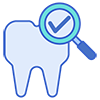What Is Wisdom Tooth Extraction?
Do you have a painful tooth at the back of your mouth? You may need a wisdom tooth extraction.
Wisdom tooth removal is a type of oral surgery to extract one of the permanent teeth behind the second molars.
Read on to find out when this procedure is necessary, what you can expect from it, and how you can prepare for it.
Why Do You Have to Remove a Wisdom Tooth?
 A wisdom tooth may need to come out if it doesn’t have enough room to grow properly and causes pain and infection.
A wisdom tooth may need to come out if it doesn’t have enough room to grow properly and causes pain and infection.
Wisdom teeth are the third molars. Most people get them between 16 and 25. In some cases, wisdom teeth grow earlier or later in life. It’s also possible for wisdom teeth never to grow.
When a wisdom tooth doesn’t have enough space to mature, it’s said to be impacted. This can occur when it grows at an angle toward other teeth or remains stuck in the jawbone.
Impacted wisdom teeth can cause pain, infection, gum disease, tooth decay, damage to the jawbone, and cysts.
Your dentist may also recommend removing a wisdom tooth if it traps food and debris, is too difficult to clean, or may harbor disease.
What to Expect During Wisdom Tooth Removal
Wisdom tooth removal is typically performed in a dental office. In some particular cases, your dentist may refer you to an oral surgeon.
It’s normally carried out as an outpatient procedure, meaning you will normally be able to go home the same day.
Before the extraction
Your dentist or oral surgeon will tell you if you need to fast and refrain from taking medication before the procedure.
You may also want to ask a friend or relative to drive you home after the extraction or get a taxi.
During the procedure
You will receive anesthesia, which can be local or general.
- Local anesthesia is delivered through injection in the gum next to the tooth. With local anesthesia, you will feel movement and pressure but not pain.
- IV Sedation anesthesia suppresses your consciousness during the procedure. It’s delivered in your arm through an intravenous line.
- Conscious Sedation: largely used in this kind of procedure, the Nitrous Oxide (laughing gas) inhalation is a safe and effective technique to reduce anxiety and produce analgesia. It helps you to relax during the treatment. It is used combined with local anesthesia.
- General anesthesia is not the norm for wisdom tooth extractions but may be recommended in special cases. After receiving it, you will lose consciousness and not remember what happened during the procedure.
Once the anesthesia kicks in, your dentist will cut through your gum tissue to remove bone. This is necessary for them to access the root of the tooth.
They will then remove the tooth and clean any leftovers from the site. In most cases, they may stitch the wound if necessary and place gauze over it to keep the bleeding in check.
After the procedure, you may experience bleeding, swelling, bruising, and pain. You may receive pain relief medication.
What to Avoid After Wisdom Tooth Extraction
After a wisdom tooth extraction, it’s best to rest. Take the day off from work and don’t do any serious work. In the following week, you should also take it easy and avoid effort.
Your doctor will tell you exactly what to do and don’t do. Here are some general pointers.
- Use an ice pack to relieve swelling and discomfort.
- Drink plenty of water.
- Don’t drink hot beverages, alcohol, and carbonated or caffeinated drinks for at least 24 hours.
- Eat soft foods in the first day or two and then transition to semisoft foods before eating solid food.
- Avoid eating hot, spicy, hard, or chewy food.
- Don’t brush your teeth, spit, or rinse your mouth for 24 hours after surgery.
- Don’t smoke for at least 3 days after the surgery.
- If you experience fever, excessive bleeding, severe pain, loss of feeling, or difficulty swallowing or breathing, contact your doctor immediately.
In the end, wisdom tooth extractions are straightforward procedures. You have nothing to fear. If a wisdom tooth is bothering you, make sure to discuss it with your dentist at Karen Dental in Mississauga.
Call Karen Dental in Mississauga. We can schedule an appointment to review your wisdom teeth as well as your dental health.

